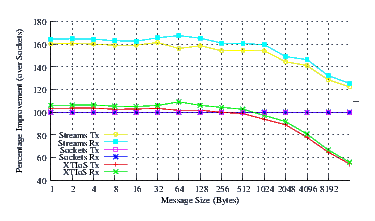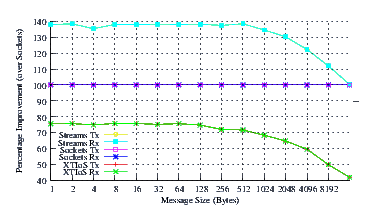User Datagram Protocol (UDP)
Description: OpenSS7 Documentation Performance.
Test Results
Until recently, we have never been able to do performance testing between Linux Fast-STREAMS
STREAMS-based UDP and Linux Native Sockets implementations of UDP. However, with the advent
of the udp2(4) driver for Linux Fast-STREAMS, and some
adjustment to the netperf package, it is now possible to perform the
tests.
Current testing performed on the streams-0.9.2.3 and strinet-0.9.2.6 packages using
netperf-2.3.6 modifications are detailed in the paper: STREAMS
vs. Sockets Performance Comparison for UDP. This paper details that current results show Linux
Fast-STREAMS UDP about 40% to 60% faster than Linux UDP.
I used to be worried that the inet(4) driver, that does
STREAMS over Sockets, would perform poorly compared to Sockets alone. After all, the Stream head
was placed over a socket using a driver and data was copied 4 times (from user to message
block, message block to socket buffer, socket buffer to message block, and message block to user).
But the report shows that STREAMS over Sockets (XTIoS) run as
fast (or faster) that Sockets alone. Also, I used to worry that STREAMS would perform
poorly on SMP (as critics of STREAMS claim). Well, the results show (see Figure 31
below) that STREAMS cleans Linux's clock on SMP nicely.
The paper details the test methodology, the results, and an
analysis of the cause.
Figure 23:
Ubuntu 7.04 on Porky Comparison
 |
Figure 31:
Fedora Core 6 on Daisy Comparison
 |
I do not think that there will be any further need for performance tuning of the Linux Fast-STREAMS
transport protocol implementations for some time to come.
Anyone on LKML wishing to complain about how slow STREAMS is can first get about fixing their Linux legacy
BSD Sockets implementation.
See also
a demonstration of Linux having its clock cleaned on pipes
and
a demonstration of Linux Sockets TCP having its clock cleaned by STREAMS SCTP.

